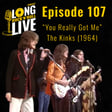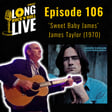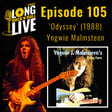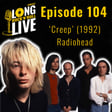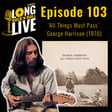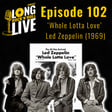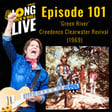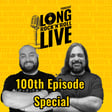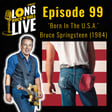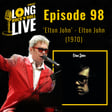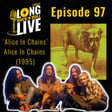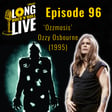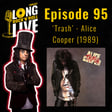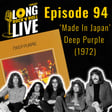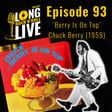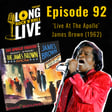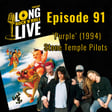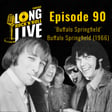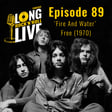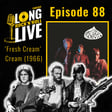Podcast Introduction and Theme
00:00:15
Speaker
Hello there and welcome to another episode of the Long Live Rock and Roll Podcast. Joining me as usual is my right hand man, Mr Felipe. Hello everyone. We're not starting with a beer today.
00:00:27
Speaker
Got coffee. Unless it's a quick made espresso, man. Cheers. Cheers for you. Let's get the episode started.
Focus on Yes: A Discovery Journey
00:00:34
Speaker
Today's episode, I'm leading the episode, if I can say it like that. Because it's about one of my favourite all-time rock bands. How many times have I said that? How many favourite bands do I have? And funnily enough, a band I'm actually not familiar with at all.
00:00:52
Speaker
And that's the other thing about the show. We like talking about stuff that one of us doesn't know much about because that's how we get to, you know, find out about new bands or old bands that we wouldn't get familiar with.
Tribute to Alan White
00:01:04
Speaker
So we're going to talk about Yes. Yes. Yes. Yes. Sounds good to me.
00:01:10
Speaker
To clear up any confusion, the English prog rock band called Yes. Yes, exactly. But interesting thing, I want to start from the end, from the most relevant current event.
00:01:27
Speaker
It's really sad that literally yesterday, Alan White died. He was, yes, drummer for ages. He was the drummer since the fourth album, if I'm not wrong. And also played with John Lennon. So Alan White is one of the most accomplished rock drummers in history for sure. And he sadly left this world.
00:01:51
Speaker
on the day before we recorded this. I don't know when you guys are going to be listening to this, but it's a wee recording on the day after Alan Wine's death. That's tragic. Yeah, he died at the age of 72 in America. That's a little bad. That's a good full life, isn't it? Yeah. Well, he lived a great life, isn't it? Imagine he played with John Lennon and Eric Clapton. What, as a session guy? As a session guy. Yeah, and George
Alan White's Musical Contributions
00:02:17
Speaker
Yeah, so I'm gonna start by telling one of his stories because one really really remarkable thing about Yes, is the fact that every musician in the band could be playing with anyone they are like they would be the perfect session musicians for any any other musician or any other band and they really really are like
00:02:43
Speaker
of the fantastic players and fantastic performers who happened to be in this amazing band and, yes, had no less than 19 full-time members. 19? Yes. And how many would normally be in the band at one time?
00:03:01
Speaker
Five. Five, okay. So they had actually four different lineups. Exactly. They actually had a lineup with eight musicians, which pretty much two bands together combined. Yeah, two drummers, two keyboard players, etc. But we're going to get into that. So to talk about Alan White first. Yeah, tell us the story. So he was a session musician in the UK and he got invited by John Lennon to play a gig and he first thought it was a prank.
00:03:31
Speaker
He's got this phone call from John Lennon himself, saying... Hello, Alan. How are you doing this evening? That's the last of the presentations I've done. So basically John called him and said... Well, yeah, I think his wife called him and said, oh, there's a guy named John on the phone. I don't know if he was talking. And he got on the phone and he was like, oh, is John Lennon here? I said, oh, really? Come on. And then...
00:03:58
Speaker
He, you know, he finally figured out it was actually John Lennon and John Lennon invited him for a gig. So, okay, the gig is in two days or something. It's me and Eric Clapton. They rehearsed on the airplane. No. Yeah, because they had no time to get together in the studio, so they rehearsed on the airplane. And the story goes that no one complained about people making noise on the airplane because we're talking about
00:04:21
Speaker
about Alan White, John Lennon and Eric Clapton.
Exploring Yes's Musical Style
00:04:23
Speaker
So would you complain if those guys were rehearsing? No, you'd be getting the same flight as you. It's a free show from the best musicians and songwriters in the world. Yeah. And he also joined, yes, in the same sort of condition. He joined the band when they were really famous and he had three days to learn the setlist. And we're not talking about learn two and a half minute pop songs, are we?
00:04:50
Speaker
talking anything between five and 20 minute songs exactly with timed odd time signatures key changes time changes bloody hell three days that's a yes that's a huge task that is that's just it's an amazing
00:05:07
Speaker
accomplishment again and he was cool, he was famous for being just cool, get each of the vibe, get the job done and everyone was happy with him. So yeah, Alan White, one of my favorite dramas for sure, I loved his style, like really solid groove and he was the
00:05:27
Speaker
one of the only members who stayed in the band with all those line-up changes. And here's the thing though, what do you think about Yes? You're not very familiar with it. What do you think? What defines Yes for you? It's really interesting because, funnily enough, Prague seems to be the one music genre that I haven't paid attention to, but only in the fact because in the literal sense, I don't have time.
Yes's Adaptability and Legacy
00:05:51
Speaker
The songs are so long.
00:05:52
Speaker
that if I want to go and listen to a Yes album or a Genesis album or an Emerson, Lake and Palmer album, it's something you've got to put aside an hour for. I don't often have a free hour. Sometimes I can do a pop album in the car, you know, on the way to this, that and the other, you know. So, but with Yes, I found I enjoyed it a lot more than I thought I would knowing if I was going into listening to a prog band.
00:06:15
Speaker
What I found, so Felipe gave me a few albums to listen to. You told me the essential ones were Fragile, Close to the Edge, 90125. So I listened to the first two fully. I listened to the highlights supposedly of 90125. And what I found interesting was that especially with songs like, with the albums like Fragile and Close to the Edge, the pure variety of music genres you're hearing within each song,
00:06:43
Speaker
Now, the time signature changes, the keyboard solos, the instrumentation used. It is prob music. That's obvious. But within those songs...
00:06:53
Speaker
I'd say in every song on the Close to the Edge album, each song had one section within the song that was funky, that you could dance to. Each song had one section which had vocals that could be in a pop song because lovely, easy melodies, beautifully sung, an accessible voice. And then the rest of the songs are all proggy and wonderful solos by Rick Wakeman.
Classic Lineup and Albums
00:07:19
Speaker
I was just surprised that there were so many agreeable moments in each song, because as you know with Prog, as we said on the MSLA compartment episode, it can become what we call, in the music world, wanky, which is where you try and just play notes for the sake of it. Yeah, like self-indulgent music. Self-indulgent, but I was so surprised how, like I said, I'm just going to repeat myself, how accessible
00:07:43
Speaker
a lot of moments in each of the songs were I think they managed to sound like soundtrack a friend of mine is cool said to me oh I don't like yes because they sound like video game soundtracks isn't that cool that you can play something that is so hard to play so musically complex
00:08:03
Speaker
And it still sounds like a video game soundtrack, which means it's entertaining, you know. I think it is. And there's something about it. We need to consider how can a band last for that long and change line-up pretty much every album, every two albums. You mentioned Friday on Close to the Edge. And they were released one after the other, so that is the same line-up. And it's one of the... Is that their classic line-up, isn't it? Yes, that's the classic line-up. So that did do some notes. So that line-up is...
00:08:34
Speaker
Do you want to tell us? Yeah. Well, I would say, to be honest, yeah, that's a classic lineup. So the classic lineup would be John Anderson on vocals, Chris Kwai on bass, Bill Bruford on drums, Steve Howard on guitar and Rick Wakeman on keys. Right. That's it. So that is the famous classic. Yes. Yes. Although shortly after close to the edge, Alan White joined the band.
00:08:56
Speaker
So that lineup clearly did more stuff together. The same lineup you just mentioned, but with Alan White instead of Bill Buford. The interesting thing is Alan White plays in a completely different style than Bill Buford. And Tony K was the first keyboard player. It's completely different from Rick Wakeman. I did read that they got Rick Wakeman in because... Did you say Tony K? Tony K was very...
00:09:25
Speaker
um reluctant to play electric keyboards yeah he was right yeah he was wanting to piano and Hammond yeah right he didn't want to do Moog he didn't want to do uh synth and all that stuff so that's why the Rick Wakeman in right exactly so here's the thing uh the what makes him uh the the history of yeah is really interesting is the fact that they
The Everlasting Nature of Yes
00:09:51
Speaker
they changed lineups so many times but the music was still there and there's still some sort of personality to it that you know that stands that they survived the all the lineup changes and all this stuff happened to them so I'm gonna quote Rick Wakeman on this because there's a great documentary which I have watched no joke in about 20 times really when I was
00:10:15
Speaker
young, that was really, it was a fanatic for prog rock. So, so yeah, I was watching it in VHS, but I recommend it, it's called Yes Years. So buy the DVD and watch it because it's amazing. So Rick Wegman says this, there could be a yes in existence way after I'm dead and buried. In the same way, there will be a New York Philharmonica or Boston Symphony Orchestra.
00:10:39
Speaker
how is that well that i mean he's kind of explained it in that quote that yes is an orchestra performing pieces of music not necessarily written by the people in the band at that time exactly and music is forever exactly as long as you can play it then there can be numerous different lineups and orchestras
00:10:56
Speaker
Yeah, and he's raising an important subject there. Should a rock band simply end when one of the classic members dies or when the lead singer, the famous lead singer is not part of it anymore? Like, can we have Pink Floyd without Roger Waters kind of stuff that people keep saying? And the answer seems to be yes.
00:11:20
Speaker
Because they still around with different members. I would come to see them if I had the chance. Imagine they all in 20 years from now, no one is around. Most members died and they still were banned.
00:11:41
Speaker
yes because they currently have two bands under the name yes it's interesting but so if you still have a band officially using the brand playing the classic songs because in the end we want to hear what the classic lineup has produced yeah yeah if someone can play to that standard why not call them yes why does it have to be a tribute band as as any orchestra is still carrying the same name
00:12:12
Speaker
Yeah. I find what's interesting about it is that actually, not in my opinion, but from what I determine rock and roll to be, I would say, okay, rock and roll is keeping the same band and if someone drops out, well, then the band's not the same anymore. But yes, quite clearly contradicting that opinion I have. Yeah.
Music vs. Lineup: The Yes Philosophy
00:12:32
Speaker
Yet they are in the proggy terms as rock and roll as anyone. Because they had that philosophy that the music was above them.
00:12:33
Speaker
we have that as a rock band? That's an interesting point.
00:12:43
Speaker
the music was bigger. The music meant more than the person, the therapist and the people. Yes, exactly. Well that's a huge statement and it's something that I'm really inclined to agree with because again, you know, how many hundreds of years has it been since Beethoven and Mozart passed away yet we still have people who we don't know the names of playing their music. Playing their music. Are they playing the way the original guys played? We don't know. No, you're right. With rock music you can't compare because you have the records but even though
00:13:12
Speaker
anyone who's going to play them is going to add their personality. Another thing that has everything to do with this subject is something that John Anderson said about the line of changes, which I'm not going to quote exactly as he said because I don't remember, but it's from the same documentary. It's something that really resonated with me. He basically says,
00:13:39
Speaker
It's like you hop on a bus. The bus is going somewhere, and you know where the bus is going. You know the direction of that bus. And you decide that you don't want to go there anymore. What do you do? You leave the bus. And someone else is going to hop into the bus, and they're going to follow the direction that everyone in that bus is following. So basically what he's saying, the lineup changes like that. We are in this bus. The bus is going.
00:14:02
Speaker
where it needs to go, and the person who joins us at that moment in time is more important for the project than the person that is leaving. And that's the truth. Someone is leaving, they're going to do something else, they're going to get into another version, and we're going to do what we're doing. So they were really, really
00:14:23
Speaker
Can I tell you the word I would say? Practical. Well, yeah, practical. I was gonna say confident. Confident. I was like, okay, we need to move on. Especially using that analogy. If he is really comparing yes to a bus and a destination, which I think is more than a fair comparison, he is saying what you've just said, which is the music matters more than the people. Yeah. Which is a huge...
00:14:44
Speaker
Especially when you consider how accomplished they were as musicians, they could be more self-indulgent, but they were actually not in that sense. Some people would say they were, but anyway, the music press never liked the magazines and the newspapers. Every time the music
00:15:05
Speaker
They were very critical and they would say awful things about them being self-indulgent, the songs being too long,
Founding Members and Early Sound
00:15:11
Speaker
etc. But rock and roll is musical freedom, as we stated many times, and that's what it is. So how did that start? I mean, the whole thing, the first two actual members of Iezwell were Chris Quire, bass player, and John Anderson, who's a singer, who occasionally played acoustic guitar. The thing is, John Anderson,
00:15:32
Speaker
plays loads of instruments. And he's a great composer, songwriter. He had loads of good ideas, but he was working in a bar.
00:15:47
Speaker
London and yeah and Chris choir played a gig at the old marquee club we've just been not that one we just had breakfast at the Montague Pike which is the last is the last incarnation of the marquee club so that that well it's in so it's still the same kind of postcode same place but not the exact same venue but the marquee club is where
00:16:13
Speaker
Chris Kwai was performing with the band and he was really good, the musicians are good, but the music was going nowhere. So the guy who owned this bar where John Anderson worked said, you know what, said to Chris Kwai, you're really good, you should get together with my friend John, he's
00:16:33
Speaker
he's got some really good songs and that was it that's how they started and they started writing stuff together and gathering musicians and trying to find the best people to play that kind of music and so they
00:16:51
Speaker
idea was whatever they were doing was a natural progression from from the 60s sound from the beaters and all that stuff now that's really funny because one of the notes I've made because I told you I'm not versed that well in prog music I all I'm doing all I've all I've heard is I quite like prog metal yeah I listen to a lot of Dream Theater and Opeth and stuff but prog is
00:17:13
Speaker
as we know it, you know, the 70s where Prague was starting to thrive, I don't really know much about. So the only ones I know a lot about now, I guess, because we're doing them now, and MSNA Compama. And one thing I found really interesting comparing them was that MSNA Compama, if you removed the Prague
00:17:32
Speaker
If you remove the progressive or prog rock label, what's the next label that comes after? For me, classical music. For yes, if you remove the prog label, what's the next genre after? Pop.
00:17:44
Speaker
Wow. I found when I was listening to Yes, like I said five minutes ago, I was hearing so many pop elements and we chatted before we'd done this episode about the album 90125, which I know you're going to go into more later, but that was the moment where you said Yes actually took quite a step in making pop music. Yeah. And you can hear that. You can hear everybody said that another
00:18:05
Speaker
Like another a complete different incarnation of the band is that some people called it West. Yes Because they were based in America and kind of whatever but the whole thing is that's a different Yeah, but I just found the interesting you say they've taken influences, but even though it's still you know why you when I say it's spot makes sense because Bill Bruford said they took loads of ideas from TV music and
00:18:29
Speaker
You know, like country music. That's Yours Is No Disgrace, that riff. He said it was like the kind of cowboy movies kind of soundtrack or TV stuff. So they wanted to... Yours Is No Disgrace. As usual, guys, this will all be on the playlist at the bottom of the show notes. So if you want to listen along whilst you're hearing this episode or listen after or before, then yeah, the playlist will be at the bottom of the show notes.
00:18:55
Speaker
Yeah, so I think it's relevant to say how the classical lineup, the classic lineup came together. So basically, when Chris Quiet joined John Anderson for songwriting stuff, he was working with a guy called Peter Banks on guitar in his band. So he brought him in to join the band. So the first
00:19:18
Speaker
The first lineup would include Peter Banks on guitar. And then they got Tony Kay on keyboards and Bill Bruford on drums. Bill Bruford put an advert on the Melody Maker magazine and he was looking for a band. And I think he said something like jazz drummer looking for a band. He was into jazz and he always considered that jazz is like the
00:19:47
Speaker
complex way of expressing yourself musically. That was his thing. It's always been his thing. And he said, I don't remember calling them. I think they got in touch with me because I put an advert. It's kind of, I wouldn't get in touch with anyone. So Bill Bruford was contacted by the other members and joined the band. So as you said, you had Tony K playing like mainly piano and Hammond and you have Bill Bruford as a jazz drummer.
00:20:14
Speaker
And you have Chris, Kwai and John Anderson with classical music influences and Beatles vocals and stuff. It's a lovely blend. It all comes together. Yes. So the first rehearsal was not far from where we are now. They rehearsed in Shaftesbury Avenue.
00:20:30
Speaker
Oh, brilliant. In June of 1968. For those listening, I know we always tell you normally where we are. I think the listeners, Felipe, have now figured out that when there's car horns, scaffolding, people talking, banging, we're in Soho. We're in the busy, beautiful Soho. When there's tractors, birds singing, we're in the countryside at my place, aren't we? Exactly.
00:20:54
Speaker
What a contrast. So if it's quiet in the background, you know we're recording a mine in the country and if it's got the hustle and bustle of London and then we're at Felipe's in Soho. So they just record it down the road. Yeah, so yeah, literally like Shaftesbury Avenue is about five minutes walk from here so they were rehearsing at the basement of a cafe.
00:21:13
Speaker
Yeah, how cool is that? And so the name came up in a conversation where John Anderson said, why don't we call the band Life? They wanted like one word. And then Chris Kwai said, world.
00:21:26
Speaker
And then, what's his name? The guitar player, Peter Banks said, yes. Because he was agreeing with Chris Quiet. He said, world. And I said, yes. And they said, oh, that's good names. So now I just said, yes, yes, yes. And that was it. So isn't that part of the band's natural creativity? They're very spontaneous.
00:21:54
Speaker
with coming up with ideas and mixing them up. So they had, according to Bill Bruford, he would stick to his jazz roots and play a jazz beat underneath whatever the other guys were doing. So they had vocals on the style of the Beatles and vocal harvests and stuff. And he would just keep what he thought was a jazz beat. Or he was intending to do that.
00:22:20
Speaker
So basically, that's again total musical freedom. They didn't care about like they wanted a good final result, a good song, but they wouldn't be worried about labeling that. Oh, it has to be more country or it has to be more folk. No, no, we're just going to play. And one big issue for them at the beginning was they were recording different parts of songs.
00:22:45
Speaker
like playing live, but playing just one section of a song, that's it. Next day they record another one. So they spent a lot of time mixing and they would have to learn the songs after that. So they never actually play songs start to finish until the album was ready. So they were doing... And yeah, so... It's a huge achievement to take that to a live setting and play that music. Isn't it what Queen did with Bohemian Rhapsody? They recorded the part separately and... Then it came together. They had to learn the song.
00:23:15
Speaker
So the first album called Yes was released in August 1969 by Atlantic Records. At the time the record labels were owned by record collectors and they didn't
Evolution and Success in Early Albums
00:23:27
Speaker
care. It's like they didn't give a flying fuck. They were like play your thing and now we release it.
00:23:36
Speaker
Because I don't know if it's going to sell or not. I don't care. You're the artist. So Atlantic Records would give them the freedom to do that kind of stuff. So the first album came out, then they released... What a lovely world, that would have been. I think on that Simpsons episode where the guy's like, can you imagine a world without lawyers?
00:23:55
Speaker
and then he goes to the dream and everyone's holding hands and there's a peace sign everywhere can you imagine the music industry without record label executives just everyone strumming guitars and having fun exactly but yeah that would be great and it wasn't a commercial music anyway they sold millions of copies so it makes us think about oh do we need to fit music into this these uh
00:24:20
Speaker
I mean, they didn't have that concept at the time. So they released an album after that called Time and the Word, which is a great album as well. And that's where Peter Banks decided to leave the band because he wasn't happy. Well, many reasons, but one of them, he wasn't happy with the use of an orchestra in one of the songs. Oh, that's interesting. Why is that? Because people had, again, they had an idea there. So that's the kind of music I was like, I mean, to rock music, there's no orchestra in rock music, right?
00:24:51
Speaker
especially Chris Quire and John Anderson, they were like, we need to be creative, we need to push the boundaries as much as possible.
00:25:01
Speaker
Anyone who wouldn't agree to that concept of being always creative, always exploring new ideas, would be kicked out of the bus, or would naturally leave the bus. Because then, yeah. Because, you know, I don't want to do this. Because then it wouldn't work together. Yeah, exactly. So the album charted on number 45. Wow.
00:25:23
Speaker
Yeah, well, actually, yeah, that was the second album, but they recorded the years album still with Peter Bax on guitar. Any of those first two albums, any songs for our listeners, any classic? Do you know what? The first one, I'm not really a big fan.
00:25:40
Speaker
Is there any song that is new? Beyond the before, yesterday and today, those songs are good. Yeah. Because there's a song, I was expecting the song to be in the album, to be honest, but it's not here. Is it No Opportunity Needed or something like that? I forgot the name of the song. It's a cover song. They played live. They did a really cool live version, but I think it's on the first album. Now, if we go into the second album,
00:26:05
Speaker
Time and the Word. The song Time and the Word is fabulous. Yeah, no opportunity needed. No experience necessary. I think that's the name of the song. That's on the second album. That's it. I don't know much about the first one. So Time and the Word and No Opportunity Necessary, which songs from the second album, Time and the Word are the ones
00:26:28
Speaker
I recommend. And those titles. Brilliant, you've learned me in the playlist. Yeah, I would say those mainly, okay. So they found their sound for real on the years album, which is the third album. Here's an interesting thing. If you buy the album today, you're probably going to see Steve Howard in the album cover, but Peter Banks recorded, if I'm wrong, all of it. But he was, or,
00:26:56
Speaker
Peter Banks was still, I need to confirm who actually recorded the guitars, but Peter Banks was still in the album Kova for the UK version, and they have Stephen Howard from the American version. That's crazy. No, it's actually Stephen Howard on guitar. Let me confirm that, but Stephen Howard on guitar on this album. That's the first album with the classic lineup, really. And it's where we have those sections of songs mixed together.
00:27:19
Speaker
And the interesting thing about them having Steven Howard is like, okay, now we have a guy who is not afraid of playing with an orchestra, as a guy who is not afraid of experimenting. And he had this vast knowledge of acoustic instruments. He owns hundreds of acoustic guitars.
00:27:40
Speaker
tunings and different stuff. And he would experiment with those things and record them. So from the years album, yours is known as Grace is the first track of the album and is one of the best tracks. The clap is just Steve Howard on guitar, is a solo guitar piece and is a masterpiece. So it's all about him really. There was a few songs like this over the albums I listened to where there was two minutes of Steve Howard just playing beautiful acoustic guitar.
00:28:09
Speaker
that he mentions of the fact that he wanted to play acoustic guitar with a band was at the time because of you know performing live would be really hard to amplify an acoustic guitar every time a band would come up with acoustic guitar parts like the whole band stops there's a bit of acoustic guitar so they would use that in studio like oh just the
00:28:30
Speaker
Let's focus on the acoustic guitar, then the whole band comes in. But he was also willing to have the acoustic guitar with the band, which happens in round the bounds on the front yard, if you listen to it. But yeah, so I recommend a few songs that I think everyone should listen to. Actually, the Holiers album is just beautiful. You also know this, Grace. The Clap and Starship Troopa. And I've seen all good people. The first four songs of the album, they're like,
00:28:55
Speaker
perfect. I did listen to Starship Trooper the other day and it was really nice. I thought there were so many lovely variations in the melodies and the structure as well. Where was I right about that song? So what I did is I listened to, first of all I went onto Yes's Spotify profile and they have the most popular songs. I listened to the first
00:29:16
Speaker
and they were owner of a lonely heart, roundabout, I've seen all good people, love will find a way, changes, sweetness, long distance, run around, leave it, and then Starship Troopa. What was interesting is that out of those first, or is it eight songs, Starship Troopa was the first one that had a solo in.
00:29:36
Speaker
it was or I mean some of the stuff does is solo e but it was so yeah as a solo there was a dedicated portion of time given to an instrument given to a member to show their skills yeah Starship Troopers the first one I heard
00:29:55
Speaker
It was just very interesting because something you associate Prague Man's a lot with is the soloing and the wankiness, as we said, and being able to show off. But I felt, yes, we're so tasteful when it comes to their take on Prague. It wasn't about the wankiness. It wasn't about the soloing. It wasn't about, you know, the virtuatisticness of their instruments. It was just beautiful music. Now that you mentioned that, one of my favorite things about Heart of the Sunrise, which is a great song,
00:30:26
Speaker
is the fact there's no solos is like 11 minute long song. Yeah and it's it's not because it's not like the guitar doesn't do something interesting but everything they do is melodies yeah it's like a proper composition like an orchestral piece all the time so
00:30:47
Speaker
And obviously the whole, so I think that's where the whole thing actually started. So clarifying what I said, you had Peter Banks up to the second album only and Stephen Howard played every single track on
Lineup Changes and Musical Boundaries
00:31:02
Speaker
Yes album so that's where the classic lineup started from and I recommend again listen to yours notice where I see if you have time to listen to one song and it's fantastic the album charted number four in the UK and 40 in the US which was pretty good so then from that point onwards Yes becomes a famous band let's put it like that so obviously there's more money coming in they can experiment even more yeah and then Tony K
00:31:28
Speaker
uh that's again no i i need to correct myself here it's not the classic lineup because we still haven't got real weight but he gets into the picture right now when tony k gets sacked from the band for the reasons you've mentioned before he didn't want to experiment with the new keyboards and synths that were coming up at the time uh so again listen the same reason for peter banks to be sacked from the band was the reason he used to sack uh tony k is like you're not
00:31:53
Speaker
experimenting. Yeah, you don't want to go where this bus is going. Exactly. And we're always going forward. We're always going to a new territory. Maybe that's it. That defines us as always some sort of new territory. We don't want to get stuck with what we did in the last album. So Tony K said it was a very kind of friendly departure that he wanted to do something else.
00:32:17
Speaker
And they saw Rick Wakeman playing with a band that was supporting them live and they were like really impressed with his skills. Rick Wakeman's hard not to be impressed by Rick Wakeman. What did you know about Rick Wakeman? You told him you knew him before you heard about him. You didn't know him about like medieval, is it what's it called? Is it Nights at the Round Table or something like that?
00:32:45
Speaker
He's a phenomenal keyboard player. He's guested on a few bands that I like albums. I don't know what they are. I just know the guys being the keyboard wizard. That's it. There's a few people you put in the sentence with him. Maybe Keith Emerson, John Ward and Rick Wacom. They have three proc keyboard masters, aren't they?
00:33:07
Speaker
people who can do that kind of stuff as he did. I think the interesting thing about him is he was already doing sessions for David Bowie, Elton John, Cat Stevens. Cat Stevens is one of my favourite artists. I didn't know he played for Cat. Yeah, he played with all those guys and when they first called him, he said, no, I've got too many sessions, no one joined. I don't want to be in bands anymore. Imagine turning sessions down, yeah.
00:33:30
Speaker
The 40 seconds he joined the band, they convinced him to come and rehearse and he said on the very first rehearsal they came up with Roundabout and Heart of the Sunrise. Wow. Like as a jam. Do you know what? That's really interesting. Talking about that, I did want to talk about, so I've made notes about when I listen to the Fragile album,
00:33:53
Speaker
Again, just for listeners, my reference to Prog is Emerson Lake and Palmer, because this is the extent of what I know Prog. Comparing it to Emerson Lake and Palmer, yes, and the album Fragile,
00:34:09
Speaker
It had so many more jammy elements than organized prog. There are sections of the song Roundabout where I thought, well, hold on now, the bass and the drums have just let loose and now they're going on this little jam. And then Steve Howe comes in with this cool riff somewhere. You can tell the music was organized, as you mentioned in the studio, the amount of time they spent mixing it. But the...
00:34:34
Speaker
I'm talking about the music as a product, the album, but the music, in musical terms, feels like a band jamming. It's quite loose, isn't it? It is, and it doesn't feel as organised as I would normally label prop to be. It's rather fragile. I think if we're talking about Emerson Lake Emparma and Yes, Emerson Lake Emparma seem organised.
00:34:55
Speaker
The music they play is very, very technical and I can imagine them being in the rehearsal room, being in the writing room, saying, right, after this section we need to go here and what we're going to do is we're going to do these notes here. Whereas, yes, I feel like it's like, okay, Chris and Bill, why don't you just groove for a bit and we'll see what we do.
00:35:13
Speaker
That's what it feels like when you hear it. It does sound like it started like that, doesn't it? Even when they get to a final form of a song. Yeah. It still feels like they were jamming at least when they were writing it. I think that's reflected in the song. Yeah, yeah. I feel like they've left the best parts of the jams in the songs. Totally. I mean,
00:35:33
Speaker
On Fragile, there's an interesting point. You're talking about being loose and being able to play whatever you want. There's five solo tracks in the album. You might not even have noticed. But I remember solo tracks as each of the band members
00:35:50
Speaker
created and organized a song by themselves. They might have other band members playing them, but I think it's mainly like one musician playing his idea. So there's one song written by Bill Bruford, one by Rick Rickman, another one by John Anderson, and then Chris Goyer and Steve Howe. So they all did solo pieces in the album. And it's like it's half of the album. Yeah.
00:36:15
Speaker
Half of the album is done as a solo thing and it still sounds like a band though. I did actually read that on my nose. You're right. Half of the album was written as a band and the other half was written as a song. And it was the first album, it was an important point. It was the first album where Roger Dean did the art for the cover. He came up with the logo and the whole visual concept for the tours and that. You know, they carried on working with him for years and years. I think visual...
00:36:44
Speaker
Or did you use visual concepts? Yeah, the visual concepts for a band, especially a prog band, is so important because when you go to see a prog band live,
00:36:56
Speaker
It's a long, it's a long experience, isn't it? Because, you know, when you think of going to your pop band, I saw The Killers are in England, you know, they're this week doing a tour. You think how many songs The Killers have where audiences can sing along to the choruses, the singer can sing the first line and give the mic to the audience for the second line. It's an immersive experience seeing a pop band. Seeing a prog band is like going to watch a movie at the cinema. You have to pay attention and it matters if you're there from the start. It's like going to watch a three hour movie.
00:37:27
Speaker
But it is because visually if you're going to watch Five Men play
00:37:34
Speaker
technically challenging music, you can expect for their performance to be of a lesser degree. I don't expect Steve Howell to be head-banging and throwing his hands up in the air during the technical cycles. So you have to bear with him. You have to say, I mean, this was a long haul. And that's where I think that, no, I'm just saying that's where the visual concept comes in because you're not watching the men head-bang. You're seeing the beautiful visual concept that Robert Dean, Roger Dean came up with.
00:38:01
Speaker
It's just a little something I wanted to say, because I was watching some videos of Tool, the metal band Tool played the other day, and they're the same. They're heavier, they're a heavier problem, but their visuals are fantastic. And it's probably inspired by the 60s and 70s. Oh, I undoubted it, I think, yeah. So basically, everything you do visually in the show is during the house, the music. Again, it's more about the music than the musicians.
Visual Elements and Stage Presence
00:38:25
Speaker
Although, everything they do individually is really hard to play. Interesting.
00:38:30
Speaker
So they charted number seven in the UK with Fragile, so going back to the timeline. We're very loose with the approach of the show. It's not a history lesson, but I want to go through some of the important moments of their history. So as I said, they charted
00:38:50
Speaker
seven in the UK and fourth in the US and that was a big deal. Roundabout was a hit for them for program funds and that took them into a natural next step which is close to the end.
Deep Dive into 'Close to the Edge'
00:39:10
Speaker
and two of my favorite songs by years on that album. And it's just the title song, Close to the Edge, is a masterpiece. I never listened to that. Beautiful. Yeah, I listened to that one yesterday. It is wonderful. There's just so many. It's three songs within a song. Yeah. But it is beautifully executed. One issue I have with prog music, and actually, to an extent, it's not just prog. It can be prog metal or just a long metal that don't have
00:39:40
Speaker
It's when you're writing a long song, for me, there has to be a logical movement from one part of the song to another. And I feel sometimes prog music is guilty of, okay, well, we finished this section, what should we do next? Oh, a bit in 7-8 in a different key, let's go for it. And then there's a list, I'm sat there going, well, hold on.
00:40:04
Speaker
it didn't really make sense to go from that part of the song to this part of the song. You needed something in between, in my opinion. But yes, when I heard Close to the Edge, it was just one long 18 minute.
00:40:15
Speaker
A masterful piece of music. It is. And everything made sense. All the transitions were logical, going from one part to another, seamless execution from the musicians. The musicianship is stunning. It's a wonderful album. As simple as it sounds, Rick Wakeman defined what they were doing as a search for emotion. Really? And he said every time someone criticized them,
00:40:46
Speaker
can do better and we're going to do what the critics don't like, which is emotion. So he said, and you and I, which is a beautiful song from Close to the Edge, is that, is the ultimate achievement in terms of delivering emotion in a Prog Rock song. I don't even know if they would consider themselves Prog, because Prog musicians never say that. But anyway, so that was an interesting point about Close to the Edge, is when
00:41:16
Speaker
Alan White first joined the band without joining the band. Bill Bruford wasn't present in one of the recording sessions and he jammed along with him. So he was there, he was a session guy, everyone knew him from the working with the
00:41:31
Speaker
John Lennon and all this stuff and he came up and he played a couple of songs, he jammed and they said it was so natural, he was such a friendly guy, easy to work with and obviously they had a few options when Bruford decided to leave the band and they said well let's go for Alan White who already jammed with us and sounded good and Bill Bruford again, listen, Bill Bruford thought yes, wasn't
00:42:01
Speaker
I can understand that from a jazz you know looking at him as a judge but he wanted to go even more
00:42:10
Speaker
down to the Prague Crimson. Yeah, so he joined King Crimson. I was just going to ask you, where do you go from yes to get more Prague Crimson? There was only one more answer, yeah, King Crimson. Exactly. I think something interesting I found about the members is the classic lineup
00:42:31
Speaker
So it was always, I said this to you earlier, before I knew who yes were, I knew who they were, if that makes sense. I had heard of Steve Howe on his own, I'd heard of Bill Bruford on his own and Chris Squire and Rick Wakeman. John Anderson was actually the one gentleman I hadn't heard of, but it's only when I did my research this week that I was like,
00:42:52
Speaker
Oh my God, Steve Haung, it's Bill Bruford, Chris Squire. It's like all these guys I know of. Yeah, because their names are so big. And this is what Yes has done for them. Yeah, exactly. I'm glad they've done it for themselves, but under the guise of Yes. Yeah, and that's why guys like Rick Reagan kept
00:43:10
Speaker
coming back to the band. He left the band so many. I can't keep count of it. He probably have left the band about 10 times enjoying them back. Because it's like he always felt comfortable playing with them. So it's like, if I ever want to be in a band, it's going to be yes. He's a guy who likes it. He's solo stuff. So basically, those two albums, if you want to, because I mean, the three albums with the
Transition to Pop Era
00:43:38
Speaker
Not the classic line-up, because you still have Tony K on the three albums you have to listen to, it's the jazz album fragile and close to the edge. It's one after the other, and you can see where they're going with their music. After that, they release a live album called Yes Songs, and then they did Tales from Topographic Oceans.
00:43:58
Speaker
which according to Rick Wakeman, not the exact words, but he says too much wanking on that album. He didn't want to go that way. He thought it was a bit too much. He didn't like the direction. Also on his 25th birthday, his first solo album achieved number one.
00:44:20
Speaker
So he said it was a really really strong feeling. You've got your solo album reaching number one and you're leaving the band that you love that you've played with for two amazing albums. So he left the band to focus on his solo career. Also he was spotted eating a burger whilst everyone else in the band was vegetarian. I don't know how much relevant.
00:44:47
Speaker
But yeah, so he quit the band or they kicked him out. I don't know. But he left the band and his first solo album is called Journey to the Center of the Earth. That's the one I know. That's fantastic. That's a masterpiece. And they had like, so we can't really go through all the lineup changes. I want to just give a few names that were relevant. One of them was Pat Moras, a Swiss piano player, keyboard player who joined after
00:45:15
Speaker
Rick Wakeman left. So they released an album called Relayer, which is kind of more jazz fusion compared to what they did before. And guess what? They sacked the guy and hired Rick Wakeman again for the next album called Going For The One, which I totally love. I think it's a beautiful album. Really, really good. And that was number one in the UK and number eight in the US. The song Going For The One is amazing. The title track and turn of the century as well.
00:45:45
Speaker
from the same album. It's the brilliant songs I totally recommend. Loads of really good acoustic work and the vocal harmonies in this album. I love it. Well there was the playlist. One album that is really important to talk about is the one you mentioned. I don't know where we were getting that on your
00:46:02
Speaker
No, we've got to get the air. I'm kind of following the notes, but I'm just like... It's an important note. This is good, mate. I've got no idea about the journey. It's really nice to hear. Yeah, I knew that you organised the ideas for this specific episode, because Yes has done so much. I think it's 22 studio albums. Wow. As I said before, 19 musicians. An extensive career, isn't it? And we want to give people the...
00:46:25
Speaker
an overall idea of what Yes is all about. So you do your research and listen to it and go for the albums. But so basically there's an interesting transition from that prog rock music into pop music. So Yes becomes a complete different band in the late 80s. So they did a couple of albums after that and to a certain point
00:46:52
Speaker
They reached a certain point where Steve Harvey, Chris Carr and Alan White were looking for a heavier sound, kind of more hard rock stuff. And at this point, Rick Wakeman leaves again. John Anderson leaves with him. So they did an album called Drummer with...
00:47:10
Speaker
Jeff Downes and Trevor Horn. So Trevor Horn was a singer. Jeff was the keyboard player. They were in another band. They had a few hits and they just joined. Yes. And the thing with Trevor Horn was he was a big fan of John Anderson. He struggled to be John Anderson live, just to deal with material.
The Pop Success of 90125
00:47:29
Speaker
So he finally decided to become a producer and he played a big role as a yes producer. So he was a singer for one album.
00:47:38
Speaker
and then he became the producer. But the band kind of splits in December 1980 and that's really interesting. Chris Choir and the White, they joined Jimmy Page and started the band called
00:47:55
Speaker
Yes, exactly. So the band went nowhere. They didn't find a singer. They were not happy to do just instrumentals and they didn't release anything at all. Well, they tried. They tried. They gave it a go. And then...
00:48:09
Speaker
they ended up finding a guy called Trevor Rabin who is an essential member of this pop phase of the band. So he joined Squire and White and brought Tony K back into the band. The band was called Cinema. It wasn't Yes, it was a new band. So that's why they were even more free to do whatever. And they became a pop band naturally. He's got this young, good-looking
00:48:33
Speaker
shredder on guitar, like fantastic guitar play, sounds like Van Halen, he's like fantastic, great musician called Trevor Rabin. And he was in charge of it with Trevor Horn, the former singer producing. So the album 90125, which the name of the album came from the catalog serial number. Brilliant. I was wondering what it was. Yeah. And it was the biggest selling album. Three million copies in the US alone.
00:49:03
Speaker
So, from that point, the number one hit they had was on the Riff of a Lonely Heart. Loads of people who were not familiar with Yes, they know that song. Yeah. Is it a pop song? I didn't know it was Yes. I knew the chorus, I didn't know it was Yes. Can we do a segment here? Yeah, sure. Can we do a Felipe Unleashed? Let's do it. Right here, ladies and gentlemen, time for Felipe Unleashed.
00:49:32
Speaker
Honor of a Lonely Heart is a great song, and yes, was a fantastic pop band.
00:49:44
Speaker
Rock fans hate the prog era, and I think it's just... So did you purposely say the opposite of what yes fans would normally say? Yes. Oh, the owner of a Lonely Heart is a shit song, and yes, we're a prog band. Is that what the yes fans would say? Yeah. I mean, we don't want this episode to last forever, so I'm just going to... Just quickly, there's a lovely song. It's a fantastic pop song, but I still feel you have the yes personality in there.
00:50:10
Speaker
You do, because it's not pop. One thing I want to add to this, just in terms of where I heard yes sort of going after this, there were three bands who, when I listened to these yes songs, came to my mind. Band number one, Supertramp. Do you know Supertramp?
00:50:33
Speaker
Yes, I know them, yeah. Just the poppy prog size, isn't it? The second band that came to my head, and this is after hearing the more poppy songs of Yes, Toto. There you go. Just that 80s kind of synth-based stuff, very agreeable melodies, three-part harmonies, very structured, very organised. And the third band, and this is actually just because of one song,
00:50:56
Speaker
Jamiroquai. Wow. The start of Roundabout really, I think, I can't, I can't tell you the exact time code, but I think it was somewhere in the first three minutes of Roundabout, I heard, I thought this could be funky. Jamiroquai. Well, dad, you know what? That bass line is quite funky. That's what I'm saying. Beazey as fuck. I just found it interesting that if you could compare, when we did ELP, we were talking about all their live album where they only did classic, classical music. I just like that with Yes,
00:51:23
Speaker
You get a bit of everything. You get the funk. What song was it here I put? Distorted South Side of the Sky from The Fragile Album. Had some really hard rock riffs in there. You got your hard rock, you got your funk, you got the prog, you got the classical elements, you got the acoustic stuff. This to me is as good of a definition as a prog band as I've ever heard.
00:51:47
Speaker
because they put everything in. Well, that's why they're so loved and hated. Yeah. Yes. They've done everything. They've been around for the last probably 20 years. They've been like recycling the old sound every now and then being more proggy. Right. And John Anderson left the band and got a new singer. It's too much going on for the last few years, but I think
00:52:13
Speaker
If you understand where they came from and all the way to the point they became a pop band and they went back to pro music, there's one point in the band's history which I think is phenomenal. 1991 they recorded an album called Union. None of them liked the album.
00:52:32
Speaker
But that's not the point.
The Union Tour and Legacy
00:52:34
Speaker
The point is they were split into two bands. So after the pop phase of the band, there was a band formed because John Anderson left after that and he joined Rick Wakeman again. So the band was called Anderson, Bruford, Wakeman, Howard.
00:52:54
Speaker
from King Crimson on the bed. What a band. Yeah, that's a long band name though. Yeah, it's an awful name. But they were doing that like all the adverts were performing the music of Yes, whatever. So they wanted to promote that as a version of Yes, they couldn't use the name. So you have that band and on the other side you had Alan White, Chris Choir, Trevor Rabin, Tony Kay,
00:53:22
Speaker
Yeah, so you have two acts together performing the music of E.S. In 1991 they came together and did a union tour as an eight-piece band. Two keyboard players, two drummers, two guitar players and one bass, one vocals. It's nice they come together, isn't it? At that point in time we have every single member of E.S. apart from Jeff Donner's
00:53:50
Speaker
What's his name? Trevor Horn and Pat Moras. So apart from three guys, Peter Banks of course. Apart from four guys, you have everyone who has ever played in the band until that point. So a lot of people. So eight people. And they performed a whole tour in America with a circular stage. Oh, brilliant. In the round. Perfect.
00:54:15
Speaker
And it's just, for me, the live versions of those songs are great. I totally recommend the album. I totally recommend the documentary, E.S. Years, which was recorded at that time, telling the story to that moment.
Personal Favorites and Insights
00:54:26
Speaker
So, yeah, the most relevant recent faxes in 2015, Chris Choir passed away.
00:54:34
Speaker
Alan White passed away yesterday. Yes, and Alan White. So they're probably grooving in heaven now. So yeah, I'd like to dedicate this show to them, to Groove and Alan White. Shall we end with a segment? Yeah. Yeah. Well, just to finish off this episode, Felipe is going to give us his top five.
00:55:00
Speaker
Felipe is going to give us his top five songs and his top three albums so take it away bro okay top five songs these will all be in the playlist as usual yeah top five songs going for the one again for the beautiful vocal harmonies great drumming he's a fantastic track uh number four would be your snorts grace lovely he's got everything uh number three close to the edge yeah
00:55:25
Speaker
Yeah, I love that one. It's very good. Second and You and I. It's one of the most beautiful love songs ever written in Sprog. And number one for me, Heart of the Sunrise. Yeah, that's the last song on the Fragile album. Fragile, yeah. Yeah, I love it. It's just a masterpiece. Everyone should listen to it. And it's the one with no solos or composition. And every instrument tells a story. That song is just beautiful.
00:55:50
Speaker
top three albums for you guys the yes album will be my number three going for the one with my number two probably not an obvious choice and most yes fans would disagree with me some people don't like the album i love it things are really cool album and number one for me is you know the classic close to the edge three songs you don't need more than that they are
00:56:14
Speaker
Yeah, I don't think we've said enough, but if you put the time and effort and dedication into a song, it's about quality, not quantity. You don't need 10 songs in an album if you can do as well as you do with three.
00:56:30
Speaker
much because obviously you know I'm sure you're familiar now that I'm normally the one that comes with all the information and this and that but Felipe's really taken sort of a hold of this episode because he loves yes I don't know much about them it's been really amazing thank you for guiding us through that the career of yes because what a fantastic band and I think the thing that's left that stuck with me most of all from this episode is the fact is the quote you said that John Anderson yes as an entity
00:56:56
Speaker
are a bus heading in a direction. And through the years, people were helping the bus, they were on the bus, getting it to its destination. And some people thought, well, you know, I've been on the bus for a while and it's not right anymore. They've hopped off, they've come back on. Others have got off and never got back on. It's just fantastic. And the last thing is that, yes, that bus is still going.
00:57:18
Speaker
And that's what's cool.
Closing Thoughts on Yes's Legacy
00:57:20
Speaker
And I hope Rick Wakeman's right and after they're all dead and buried they still have yes performance for people because the music is amazing and maybe they are one of the few rock bands where the music is actually bigger than the musicians no matter how self-indulgent they are. That's important with Prague you're right yeah. Final question to you
00:57:49
Speaker
Why are yes so important to rock and roll? For constantly moving forward in terms of their sound. Never accepting to play the same thing in the same amount. And for keeping an identity
00:58:09
Speaker
over so many lineup changes. That's it. And again, that's it because the music is bigger than the musicians. And I think they did that really well over the course of their career. So yeah, Hans, off to you. Beautifully said, man. Beautifully said. As we said twice before, this episode is for Chris Squire and Alan White. So maybe both rest in peace.
00:58:28
Speaker
Thank you very much for joining us again, guys. Another great episode again. Thank you, Felipe, for all your efforts, man. That was really interesting. We're doing a normal thing now, as you know, you're probably used to it. Find us on the internet. Like, subscribe, share, all that stuff. But we're on the internet. Where? Where about? www.google.com. Oh, right. So if you search from there, yeah. OK, long live round your podcast. We are on the internet. Excellent. Thank you very much, guys. Hope you had a good episode. Thank you. And keep on rocking, everyone.
00:58:58
Speaker
And as usual, long live rock and roll.

